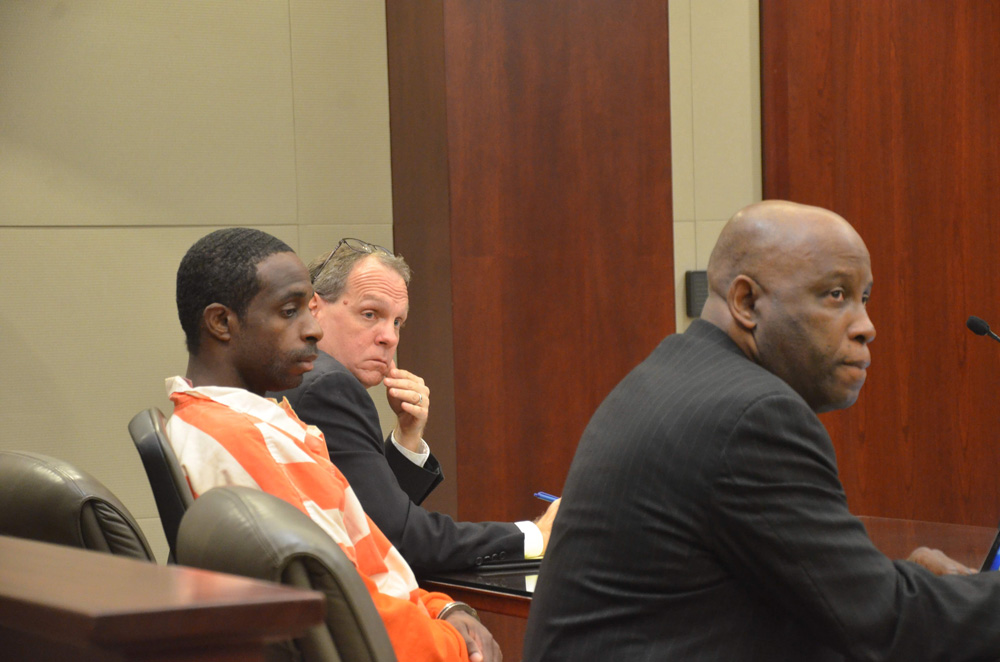
In a couple of previous hearings about his death conviction and his eligibility for a new sentencing-phase trial, Cornelius Baker opted to stay in what passes for his home–the cell in solitary where he spends 23 of his 24 hours each day at the state prison in Raiford, within walking distance of the death chamber. His attorney, Junior Barrett, last month asked a judge to order that Baker show up for his latest pre-trial hearing, which took place earlier this week. So Baker did. But he might as well have stayed in solitary.
A few words here and there aside, hardly anyone addressed him for the 10 to 15-minute hearing when he walked in a bit late for a hearing whose script might have been penned by Franz Kafka. All he learned was that while only a few weeks ago he’d been eligible for a new sentencing trial, that possibility may now be off the table: the prosecution told the judge it is ready to file a motion arguing that the re-sentencing is no longer necessary, now that the Florida Supreme Court has reversed the earlier ruling that had made it necessary.
Scores of death row inmates like Baker have seen their fate whiplashed from one Supreme Court decision to the next since 2016, when the U.S. Supreme Court first determined that Florida’s death-penalty method was unconstitutional, then the state Supreme Court ruled that death-penalty jury recommendations had to be unanimous–which in Baker’s case, it had not been: a jury recommended death 9-3–and the legislature followed suit by rewriting the law to that effect.
All that was upended late last month when the state Supreme Court reversed most of the previous ruling on unanimity requirements. In Hudson’s words at Monday’s hearing, “we had an intervening event and that is the Supreme Court’s new opinion, State v. Poole, that basically calls into question as to whether or not a re-sentencing hearing is necessary.”
But beyond that, the judge, the defense and the prosecution were not too sure what to do next at the Feb. 3 hearing, and Baker looked on as if dazed by the uncertainty in the lawyers’ exchanges.
“The state believes that we’ll be entitled to ask for reinstatement of the death penalty,” Assistant State Attorney Jason Lewis said. For Barrett, the defense is not ready to address that motion. It would need at least a month to prepare a response, if for no other reason than to preserve arguments for the appeal phase–because regardless of the outcome at this stage, the case will be appealed.
The defense, the prosecution and the judge also have no idea whether the legislature will again change the law in light of the Poole decision. They have no idea whether the Poole decision itself will be subject to a re-argument before the Florida Supreme Court. They have no idea whether Poole will be–as it may very well be–appealed to the U.S. Supreme Court. So it goes with death penalty-law in Florida and 29 other states where it’s still applied: it’s unpredictable.
Hudson herself told the lawyers she’d done “a lot of reaching out in the last couple of days,” finding that the majority of courts around the state are waiting to see if there’s a rehearing or an appeal of the Poole decision “before they consider rescheduling anything.”
“To be honest, I’m not sure that a motion for reinstatement would be appropriate until the dust is settled either,” Hudson told the lawyers.
So they all agreed to this: If there’s no appeal, a hearing on the state’s motion for reinstatement will be set for March. If there is an appeal, Hudson will hold a hearing on procedural matters, a sort of status hearing, in about three months.
As the docket stands, no hearing is scheduled for now. But Baker, who was ushered out of the courtroom and back to his solitary cell the next day, will be required to attend any hearing that is set.
Baker was convicted in the kidnapping and murder in 2007 of Elizabeth Uptagrafft, whose body he left in the Mondex woods after assaulting her and her family in Daytona Beach.





























Leave a Reply